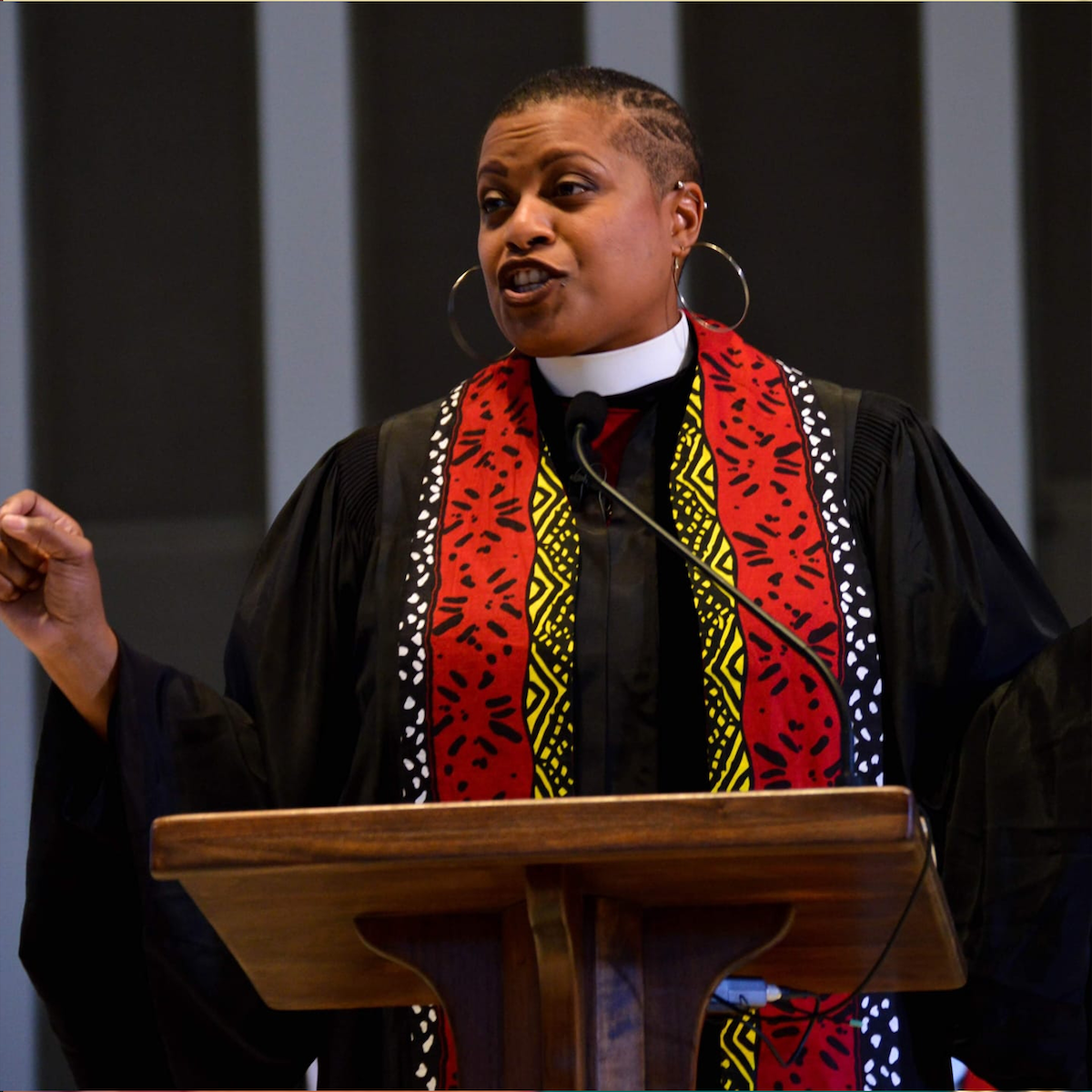Luke 2:22-40; Galatians 4:4-7
In 2008 Michael E. Ross wrote a piece for The Root examining the misuse of the word/song “Kumbaya” in American politics. Ross noted that “Derision of the song and its emotional foundation has become a required sign of toughness and pragmatism in American politics today, and this is especially true since the Sept. 11 attacks.” Indeed, many instantly imagine white hippies around a bonfire when they think of the song, but too few understand its origins or what the word “Kumbaya” even means.
For enslaved Africans and their descendants, it was a pidgin construction from the English, “Come by here.” It was/is an invocation, asking God to step into their situation and save them from their oppression, to lift their heads and hearts. That my ancestors are so often removed from the song’s narrative and that this prayer has somehow become pejorative is a prime example of how the wounds of my people are treated carelessly. The powerful (by this world’s standards) cannot fathom having to cry to God in this way, much less can they imagine God answering such cries. Truthfully, it’s also hard for the oppressed to imagine God hearing these cries, especially after we’ve been singing the song for so long.
We’re in that odd space between Christmas Day, the day that we commemorate Christ’s birth, and Epiphany, the day that, with the Magi’s revelation of who Jesus is, the rest of the world realizes/learns what has happened. Before this, we spent four long weeks of Advent, pining for the coming of Christ. We sang, “O Come O Come Emmanuel.” We sang “Come Thou Long Expected Jesus.” And if you were like me, you sang Walter Hawkins’ rendition of “Come By Here, Dear Lord” — and you meant it.
You meant it because over 300,000 people in the U.S. have died of a disease that did not exist last year.
You meant it because one thing a global pandemic couldn’t stop was extrajudicial killings of Black folks.
You meant it because you may be like thousands of others who lost their jobs this year.
You meant it because every time you turned around, you were greeted with the news of the loss of a friend or loved one.
You meant it because the so-called “Most Wonderful Time of the Year” is in any given year the most heart-wrenching time because it’s when you most miss the ones you’ve lost.
You meant it because, more than anything else you ever wanted, you needed the Lord to show up. You needed the in-breaking of Christmas to affirm the hope of Advent. You needed to know that help was indeed on the way and that you weren’t naive for expecting and believing it was.
With Christ’s in-breaking, something changed. Israel under Roman occupation was profoundly affected by the birth of a baby in Bethlehem — indeed, the world was profoundly affected. But at the same time, the effects weren’t palpable at first. Not everyone realized what had happened because they couldn’t yet feel it.
Israel was still under Roman occupation. They were still being taxed into abject poverty. There was still a ruthless puppet monarch in place who was arguably worse than Caesar himself. They were still worshipping in a temple that was, more than anything, a shrine to this puppet monarchy. They were still living in the specter of a promising, yet failed revolt. They were still looking for their redemption from somewhere. Anywhere. Even after the in-breaking, it still wasn’t all good.
So it is for us. In these days immediately following Christmas, we’re still in a pandemic. We still miss our lost loved ones. We’re still inundated by the most horrific of stories of violence and death whenever we read the paper or watch the news. We’re still climbing out of financial holes that were dug during the recession. We’re still looking, waiting, and hoping for redemption from somewhere.
Come by here, dear Lord, come by here!
Yet, the promise of the in-breaking is this: not only is the help you longed for during Advent on the way, but it’s never been closer than it is now. In fact, it is here! Even if you can’t yet see it, it is here. Even if you can’t yet feel it, it is here. Even if you can’t yet enjoy it, it is here.
During the ritual dedication of Jesus, we listen to Simeon’s words and hear that the child’s birth — the in-breaking — had implications not only for now, but for later. With his birth, the wheels were set in motion for revolution.
“This child is destined for the falling and the rising of many in Israel, and to be a sign that will be opposed so that the inner thoughts of many will be revealed — and [Mary] a sword will pierce your own soul too.”
Everything was about to be shifted, though they didn’t see it at the time. They were shocked by Simeon’s words.
Enter the prophet Anna to further confirm what was going to happen with this 17-week-old baby. She was a widow who hadn’t been married for long before her husband died. In her context, there likely weren’t many options for housing and community available to her. Widows were often at the mercy of others. For about sixty years, Anna’s days had been spent in the temple, fasting, praying, working and waiting for redemption. Her people were hurting. She was hurting. I imagine there may have been times even in her very steadfast life where she felt discouraged. Sixty-ish years is a long time to wait for relief. Now, like Simeon, she felt assured that all her dedication hadn’t been for nothing.
And please don’t miss the significance of all these things occurring in the temple built by the one who was taking up space on that baby’s throne! Things had indeed changed.
The in-breaking teaches us that looks can be deceiving. Just because we can’t yet feel our help doesn’t mean that our help isn’t here. But, goodness, a little reassurance goes a long way! Some years ago, my mother had been experiencing stomach pains for a week, which her doctor attributed to gallstones. She was scheduled for surgery to remove her gallbladder a week and a half later, but if you’ve ever had gallstones, you know that’s too long to wait! And since my father was out of town, I’d agreed to come and help her out until he could come back. A few short hours after I got to her house, she could no longer take the pain and asked me to drive her to the ER. Though the stones were still in her gut, things had changed for her by virtue of being in the hospital. Because she was somewhere she could get some help, even as the pain persisted and would persist for some time after the surgery, she could yet breathe easier. Even if her circumstances didn’t change immediately, she knew help was coming and that meant everything.
We are witnessing the in-breaking, as Trito-Isaiah would say, the earth bringing forth its shoots. In summer, we see the lush vegetation all around and we know that life is and has been among us, even when the trees were without their leaves. With the first shoots of spring, we are encouraged that life has been at work all along.
With these glimpses of hope, our Advent songs give way to songs like the one sang by the prophet:
For Zion’s sake I will not keep silent,
and for Jerusalem’s sake I will not rest,
until her vindication shines out like the dawn,
and her salvation like a burning torch.
That is the challenge of the Christmas season: to keep believing, to keep hoping, to keep pushing, to keep singing until vindication comes. It’s to believe in the hope we clung to during Advent because God has confirmed for us that our hope is not in vain. Indeed, God has – and will – come by here.

REV. DENISE ANDERSON is a Presbyterian minister, writer and artist based in Louisville, Kentucky. She serves as the Presbyterian Mission Agency’s Coordinator for Racial and Intercultural Justice and previously served as Co-moderator of the 222nd General Assembly of the Presbyterian Church (U.S.A.).



Unbound Social